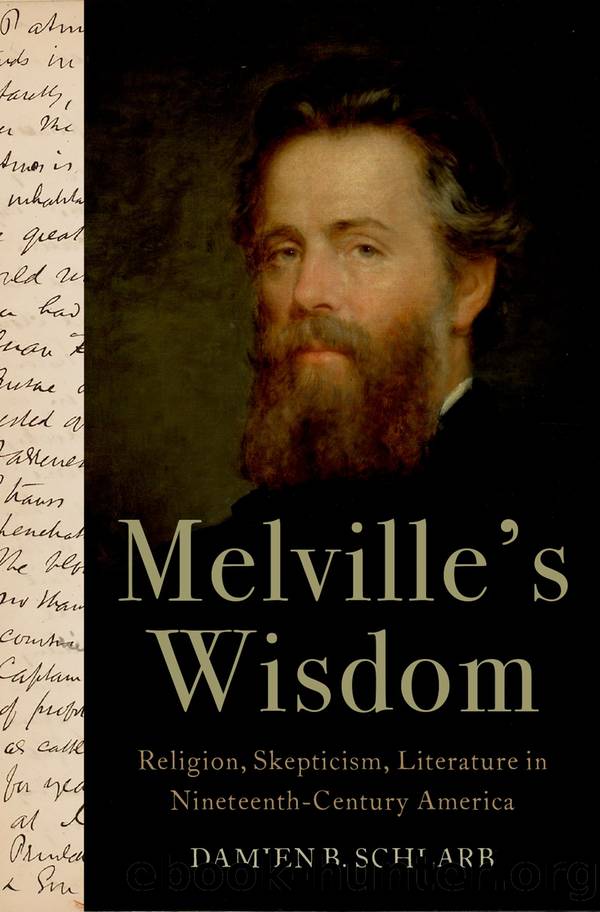Melville's Wisdom by Damien B. Schlarb

Author:Damien B. Schlarb
Language: eng
Format: epub
Publisher: Oxford University Press
Published: 2021-10-15T00:00:00+00:00
Wisdom Aphorisms and the Postsecular
Billy Budd shows that wisdom did not escape the storm of modernity unscathed, even in Melvilleâs literary imagination. While historical criticism and a New Testament exegetical bias among clergy opened the Old Testament up to literary exegesis, the Bibleâs loss of moral authority also hamstrung the wisdom books in a very practical way: readers could no longer consult them haplessly in the kinds of spiritual crises that increasingly inundated Americans. Still, wisdom could supply a language for examining humanityâs role in its own moral history and enable at least some sort of self-triangulation in a world seemingly set adrift. The popularity of religious moral-reform novels, like Susan Warnerâs The Wide Wide World (1850), Harriett Beecher Stoweâs Uncle Tomâs Cabin (1852), and Susan Elizabeth Phelpsâs The Gateâs Ajar (1869) illustrates that such triangulation by literary means could have major (subversive) effects on communal life.209 But as Melville shows in The Confidence-Man, even wisdom could be co-opted to nefarious ends, and so he grew increasingly skeptical about the propects of large-scale social reform based on religious language.
Earlier in his oeuvre, Proverbs connoted revolutionary political potential, but soon this sunny aspect gave way to a grimmer view: biblical wisdom had been rendered ineffectual and could be used only to indict American cultural institutions, market capitalism, and personal predilections all of which successfully conspired to purge wisdom from all personal interaction and jurisprudence. Proverbs authorizes a meta-discussion about the history and form of the Bible and its interpretations in modern America, but also of the countryâs political, economic, and cultural industries. Melville uses Proverbs to interrogate the ways in which savvy and cunning operators manipulate interpretation to distort wisdom. He shows that contemplative reading fortifies believers neither against the machinations of charismatic agents of folly nor against the institutional folly of modern secular legalism that inadvertently authorizes moral evil. In part, such manipulations became possible because careful reading fell out of style, also because of how rapidly texts in general multiplied in the nineteenth century. The booming periodicals market introduced the idea that texts could be disposable and conditioned people to read superficially, a necessary tactic to keep up with the increased pace of work and social life. Contemplation became a luxury reserved for the well-to-do. In contrast, proverbs require of their readers self-analysis, a practice in which they apply the dense language of the aphorisms to their own experience. This prudent reading in turn occurs in the reverent mindset. In the wisdom cosmology, fearing God does not mean dreading personal injury but respecting the fact that wisdom comes from the divine and transcends either purely textual or purely experiential advice. Melville diagnoses in his countrymen a recalcitrance toward this kind of reading, which makes them susceptible to all manner of folly.
The confidence man can claim a proverb about reliance on God as his mantra because his victims have collectively declared wisdomâs moral upbraiding incompatible with their national philosophy of self-reliance. Reading must be quick, self-affirming, and uplifting. In this
Download
This site does not store any files on its server. We only index and link to content provided by other sites. Please contact the content providers to delete copyright contents if any and email us, we'll remove relevant links or contents immediately.
What's Done in Darkness by Kayla Perrin(25500)
Shot Through the Heart: DI Grace Fisher 2 by Isabelle Grey(18219)
Shot Through the Heart by Mercy Celeste(18160)
The Fifty Shades Trilogy & Grey by E L James(17774)
The 3rd Cycle of the Betrayed Series Collection: Extremely Controversial Historical Thrillers (Betrayed Series Boxed set) by McCray Carolyn(13189)
The Subtle Art of Not Giving a F*ck by Mark Manson(12912)
Scorched Earth by Nick Kyme(11832)
Stepbrother Stories 2 - 21 Taboo Story Collection (Brother Sister Stepbrother Stepsister Taboo Pseudo Incest Family Virgin Creampie Pregnant Forced Pregnancy Breeding) by Roxi Harding(11040)
Drei Generationen auf dem Jakobsweg by Stein Pia(10217)
Suna by Ziefle Pia(10186)
Scythe by Neal Shusterman(9259)
International Relations from the Global South; Worlds of Difference; First Edition by Arlene B. Tickner & Karen Smith(8608)
Successful Proposal Strategies for Small Businesses: Using Knowledge Management ot Win Govenment, Private Sector, and International Contracts 3rd Edition by Robert Frey(8419)
This is Going to Hurt by Adam Kay(7695)
Dirty Filthy Fix: A Fixed Trilogy Novella by Laurelin Paige(6453)
He Loves Me...KNOT by RC Boldt(5804)
How to Make Love to a Negro Without Getting Tired by Dany LaFerrière(5378)
Interdimensional Brothel by F4U(5304)
Thankful For Her by Alexa Riley(5161)
